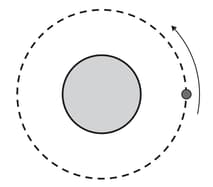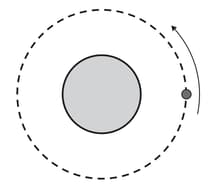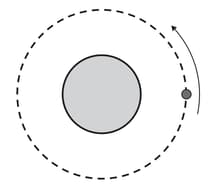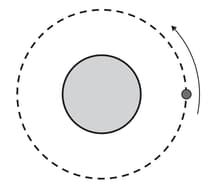Consider two spherical bodies of mass and as in the diagram.

There is a point somewhere on the line joining the masses where the gravitational field strength is zero.
Determine the distance of point from the centre of the bigger mass in terms of , the centre-to-centre distance separating the two bodies.


Important Questions on Circular Motion and Gravitation
Consider two spherical bodies of mass and as in the diagram.

There is a point somewhere on the line joining the masses where the gravitational field strength is zero.
Draw a graph to show the variation of the gravitational field strength due to the two masses with the distance from the centre of the larger mass.
Consider two spherical bodies of mass and as in the diagram.

There is a point somewhere on the line joining the masses where the gravitational field strength is zero.
A small point mass is placed at .
State the force on .
Consider two spherical bodies of mass and as in the diagram.

There is a point somewhere on the line joining the masses where the gravitational field strength is zero.
A small point mass is placed at .
The small mass is slightly displaced to the left of . State and explain whether the net force on the point mass will be directed to the left or to the right.
Consider two spherical bodies of mass and as in the diagram.

There is a point somewhere on the line joining the masses where the gravitational field strength is zero.
Describe qualitatively the motion of the point mass after it has been displaced to the left of .
A satellite is in a circular orbit around a planet of mass , as shown in the diagram.

On a copy of the diagram draw arrows to represent the velocity and acceleration of the satellite.
A satellite is in a circular orbit around a planet of mass , as shown in the diagram.

Explain why the satellite has acceleration even though its speed is constant.
A satellite is in a circular orbit around a planet of mass , as shown in the diagram.

Show that the angular speed is related to the orbit radius by .
A satellite is in a circular orbit around a planet of mass , as shown in the diagram.

Because of friction with the upper atmosphere, the satellite slowly moves into another circular orbit with a smaller radius than the answer in that is . Suggest the effect of this on the satellite’s:
angular speed
